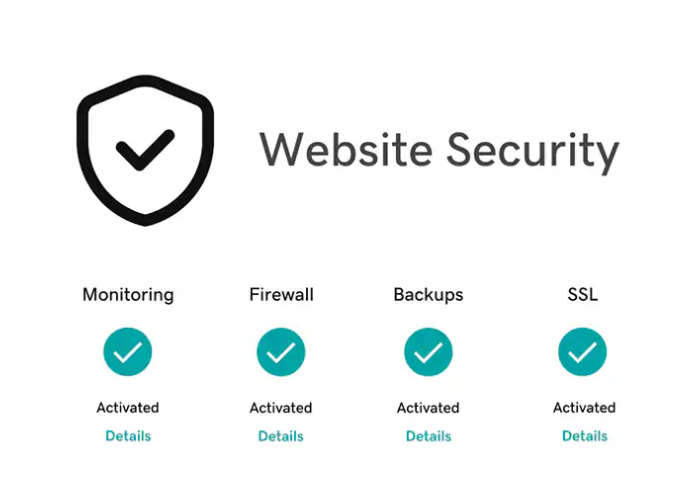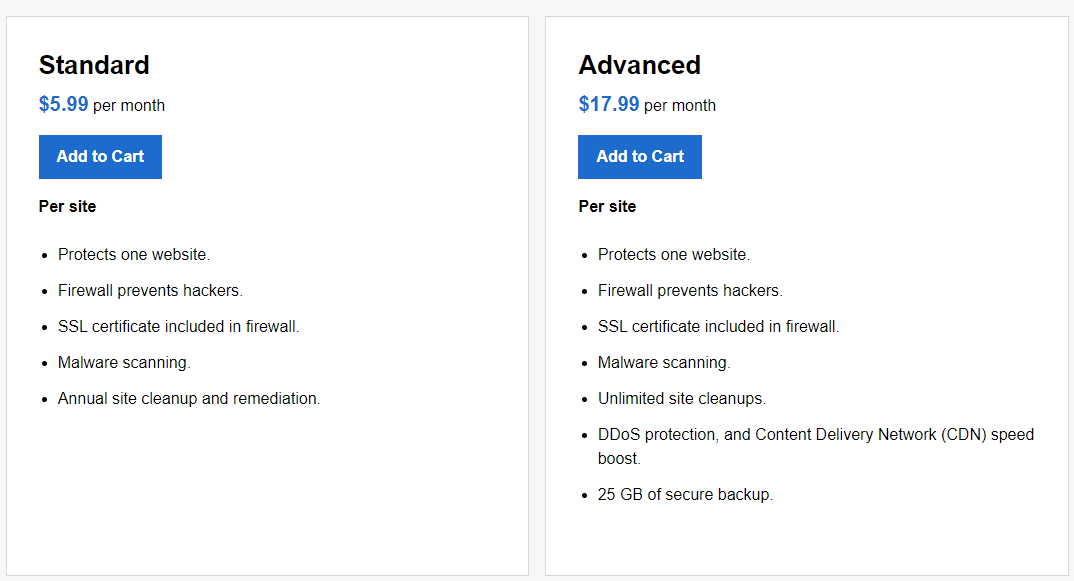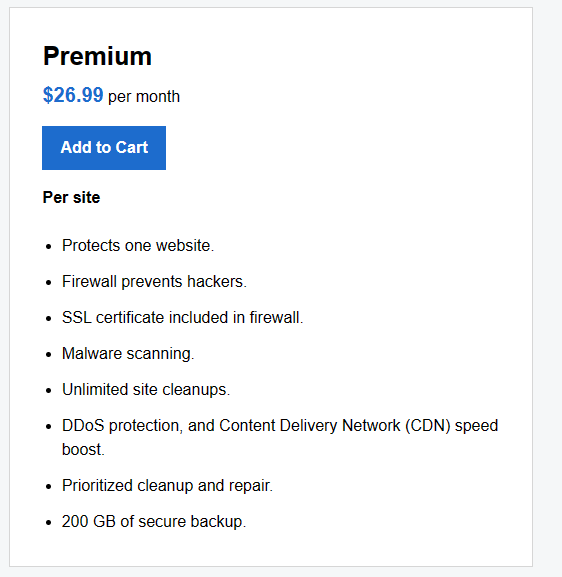Website Security provides easy-to-use tools to help protect your site from the most common security threats. After all, your website’s the center of your business, your brand and all the amazing things you’re bringing to the world. It deserves website security tools to help provide broad protection.
What’s Website Security?
Website Security provides easy-to-use tools to help protect your site from the most common security threats. After all, your website’s the center of your business, your brand and all the amazing things you’re bringing to the world. It deserves website security tools to help provide broad protection.
Included in Every Website Security plan:
- Protection for unlimited pages within a single website.
- Protects one website.
- Firewall prevents hackers.
- SSL certificate included in firewall.
- Malware scanning.
- Unlimited site cleanups.
- DDoS protection, and Content Delivery Network (CDN) speed boost.
- Secure backup.
- Security analysts for advanced issues.
- Advanced security monitoring.
- Google blacklist monitoring and removal.
- Brand reputation monitoring.
- Unlimited malware removal and hack repair.
- Trusted site seal.
- 100% clean site – guaranteed.
- 30-day money back guarantee.
- Compatible with most CMS and custom-coded sites.
- Advanced protection and speed boost.
- CDN performance accelerator and Advanced DDoS mitigation.

Benefits of Website Security
1. Show visitors you take your site’s safety seriously
All Website Security plans include an SSL Certificate — which comes with our Web Application Firewall (WAF), allowing your site to provide HTTPS encryption. This lets visitors know that your site’s trustworthy and that any data they exchange with your site is encrypted, keeping it safe from snooping or exploitation.
Our WAF is designed to intercept and examine incoming data and neutralize malicious code from security threats like SQL injections and DDoS attacks. Plus, our Content Delivery Network (CDN) provides even further protection from DDoS attacks by restricting access to your site’s original server.
2. Help prevent attacks and fix malware problems
Take a proactive, preventative approach to the safety of your website. The Website Security firewall helps block attacks on your site while its malware scanner regularly searches your site for malicious content and alerts you if any is found.
3. Increased speed — coupled with encrypted data — boosts search rankings
Google heavily favors SSL-protected encrypted sites and pushes them higher in search rankings than those without, helping your business become more visible to new potential customers. And not only does our Content Delivery Network (CDN) help protect your site from DDoS attacks, but it also boosts your site’s load time by up to 50% by putting your content on multiple servers around the world, so it’s always close to your customers.
4. Website backup with one-click restore
With Advanced and Premium Plans, get daily, automatic backups** of your website. One-click restore lets you reinstate a clean version of your website with just a single click.
5.We Offer Complete Protection and Peace of Mind
6. Malware doesn’t discriminate
In fact, it’s an equal-opportunity menace because most malware attacks are triggered by automation, so that means literally anyone is a target. And if you do get infected, and you don’t have an immediate response mechanism in place — like GoDaddy Website Security — it can do more than just disrupt your site. It’ll ruin your reputation, and that’ll chase prospective customers away.
Think of it this way: Securing your site is like locking the doors to your house at night. You don’t do it because you expect something bad to happen — you do it because it significantly reduces the risk of uninvited and unwelcome access.
Website Security FAQs
What makes Website Security so simple?
Where can I find my SSL Certificate?
If I have an SSL Certificate, do I still need Website Security?
Yes — while an SSL certificate encrypts data being transmitted to and from your website, it doesn’t protect your site from other vulnerabilities, such as malware, SQL injections or DDoS attacks. By utilizing both an SSL and Website Security, you are taking steps to help protect more aspects of your site.
How often does Website Security scan my site for malware?
How does a Web Application Firewall (WAF) secure my site?
How does the Content Delivery Network (CDN) speed up my site?
Definitely. An SSL encrypts data being transmitted to and from your website — it doesn’t protect your website from other vulnerabilities, such as malware, SQL injections or DDoS attacks. By utilizing both an SSL and Website Security, you’re using a complete security suite to protect your website, your customers and their data.
How you build your website is entirely up to you. In fact, most basic secure websites can be hand-coded using HTML.
When a visitor enters an SSL-protected page on your website, their browser bar displays a padlock icon and the https:// prefix in the URL address. While most Internet users know to look for those SSL indicators, you can also add a site seal to your website to show visitors your site is verified and secured. Visitors can click the seal to view your certificate’s status and details, seeing for themselves that it’s safe to send sensitive information to your website.
Leave a Reply
You must be logged in to post a comment.
An SSL certificate ensures safe, easy, and convenient Internet shopping. Once an Internet user enters a secure area — by entering credit card information, email address, or other personal data, for example — the shopping site’s SSL certificate enables the browser and Web server to build a secure, encrypted connection.
The SSL “handshake” process, which establishes the secure session, takes place discreetly behind the scene without interrupting the consumer’s shopping experience. A “padlock” icon in the browser’s status bar and the “https://” prefix in the URL are the only visible indications of a secure session in progress.
By contrast, if a user attempts to submit personal information to an unsecured website (i.e., a site that is not protected with a valid SSL certificate), the browser’s built-in security mechanism triggers a warning to the user, reminding him/her that the site is not secure and that sensitive data might be intercepted by third parties. Faced with such a warning, most Internet users will likely look elsewhere to make a purchase.
Leave a Reply
You must be logged in to post a comment.
HostsDepot SSL certificates inspire trust and show visitors that you value their privacy. An SSL certificate protects your customers’ sensitive information such as their name, address, password, or credit card number by encrypting the data during transmission from their computer to your web server. SSL is the standard for web security, and a server certificate is required by most merchant account services – you’ll need one if you plan to accept credit cards on your website.
Leave a Reply
You must be logged in to post a comment.



Leave a Reply
You must be logged in to post a comment.